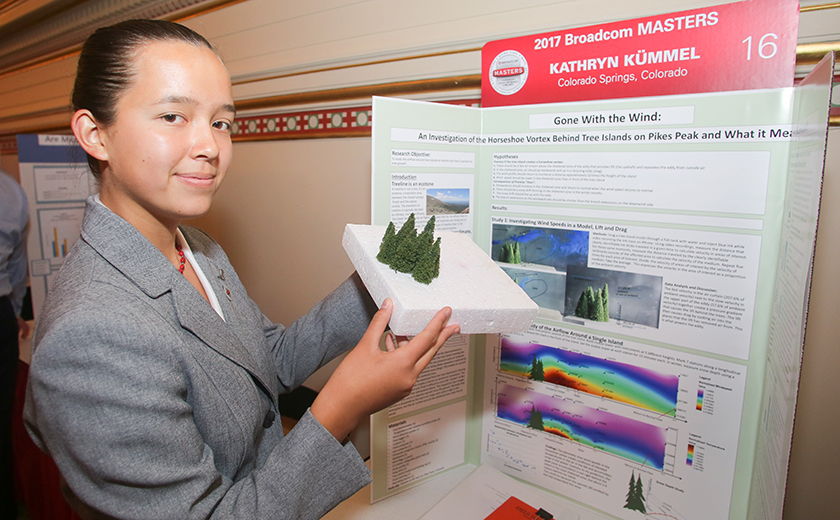Remember to complete your Broadcom MASTERS 2018 application

The Society is excited to welcome the next class of young STEM innovators. The top 10 percent of 6th, 7th, and 8th grade projects at Society-affiliated science fairs have been nominated to compete in Broadcom MASTERS 2018. The application closes at 8 p.m. on June 13.
The deadline is coming up, so don’t forget to complete your application if you were nominated. You can view webinars offering guidance about completing the application on YouTube.
For questions about the program, please email masters@societyforscience.org.
Read about one Broadcom MASTERS 2017 alumna’s experiences below.
After participating in Broadcom MASTERS 2017, Kathryn Kummel entered high school and went on to compete at Intel ISEF 2018. She worked on a project with her sister, investigating the geomorphic characteristics of an eroding arroyo, a steep gulley created by running water in arid or semi-arid regions, using 3D modeling technology and drones.
Kathryn wants to continue to qualify for Intel ISEF in the coming years, and take fun new math classes. “I also want to build more drones and learn more about how to code them,” she said.
For her Broadcom MASTERS project, she studied how the airflow around a tree island impacts tree growth and results in a unique microclimate. A tree island is a small clump of trees that grows in extremely close proximity at the tree line, the perimeter of a habitat where trees are capable of growing.
Kathryn created a model tree island using a special fish tank. In the model, she simulated airflow to test if a horseshoe vortex, or an eddy, would form behind something tree island-shaped. She found that eddies did, in fact, form with her models, and she created wind profiles from her data.
“Tree islands create horseshoe vortices behind them, creating calmer conditions,” Kathryn explained. “The warmer, calmer conditions at the leeward sides of the tree islands create better tree growth.” Her findings can be applied to agriculture, where providing a calm climate may increase crop yield.
Kathryn believes science competitions are important because they encourage young scientists and reward exemplary work. “All science competitions have the potential to push forward amazing young scientists, who become more motivated to excel in science through top competitions like Broadcom MASTERS,” she said.
As a kid, Kathryn went into the field with her dad to collect research data on a variety of STEM topics. Her parents encouraged her love of math. “In sixth grade I did my first science fair project, and haven’t looked back ever since,” she said.
She encourages other young people interested in science to realize: “you are the future of science and innovation. No matter if you make it to be a semifinalist, finalist, or anything else. Never stop doing science!”


